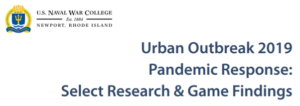Non-Nuclear vs Nuclear Adversaries: a “game changing” book?
Tuesday, August 25th, 2020[ by Charles Cameron — a quick one, of strategy & game interest, from WOTR ]
.
I thought this paragraph might interest ZP readers, since the book argues for a new concept in conflict between non-nuclear and nuclear adversaries> The para (or should I say, graph) that follows is taken from a review of Paul Avey, Tempting Fate: Why Nonnuclear States Confront Nuclear Opponents by Alexander Landszka in War on the Rocks:
Avey’s argument is straightforward: If the conventional military balance favors a nuclear-armed state to such an extent that it would not need to resort to nuclear weapons to defend itself and its vital interests, the non-nuclear state may challenge or resist it in a militarized dispute. A sort of “Goldilocks rule” is at play here. If the non-nuclear state is conventionally too strong vis-à-vis the nuclear state, then the latter may be tempted to use nuclear strikes to achieve favorable outcomes on the battlefield. The possibility of nuclear weapons use deters the non-nuclear state. If, however, the non-nuclear state is conventionally too weak vis-à-vis the nuclear state, then the former will not be able to initiate a military conflict in the first place. Avey claims that the non-nuclear state’s leaders do not abide by the nuclear taboo while challenging a nuclear-armed adversary. These leaders believe that amoral strategic reasons — and not moral misgivings — will constrain the adversary from launching nuclear weapons. To support his argument, Avey examines Iraq’s confrontational policies toward the United States in the 1990s, Israeli decision-making toward Egypt in the late 1960s and early 1970s, Beijing’s hostility toward the United States in the 1950s, and Soviet-American tensions in the early days of the Cold War.
Afrer posing some questions about Avey’s arguments, the review concludes:
This is yet another sign that Avey has written a very good book. It gives inspiration for fresh theorizing and more empirical scholarship. Notwithstanding my questions about the nuclear revolution and the Israeli-Egyptian case study, Avey wisely hews close to the evidence and never overstates his arguments. Tempting Fate is a must-read for anyone interested in nuclear politics.
Me, I’m going to think about smaller boys taunting big enough bullies that they can get away with it in (British) Public Schools (American “Prep Schools”).. a subject close to my heart.












